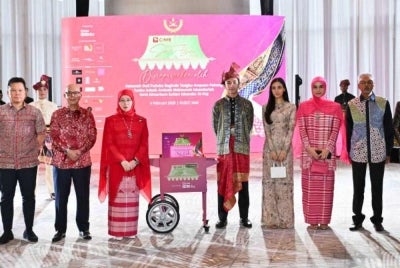A story of rural revival: The Penan Women who wove their own destiny
In conjunction with today's International Day of Rural Women, delve into the inspiring journey of Penan women, who are weaving more than just baskets; they're crafting a future of empowerment and resilience in rural Malaysia.
ILI LIYANA MOKHTAR and HASHINI KAVISHTRI KANNAN


SHAH ALAM - Rural women in Malaysia are largely associated with a low level of education and low participation in the workforce, and they only play the role of mothers and wives without any active participation in any economic activities.
It is also notable that the traditional role of women as housewives in rural areas is still apparent.
But this narrative is changing.
These women are emerging bolder now and actively shaping their communities' economic landscapes, thanks to government and non-governmental initiatives.
The Miri Women Weaving Association takes a leading role in training Penan women in modern economic practices, promoting sustainability, and advocating for formal education for their children.
In celebration of the International Day of Rural Women today, Ann Wong, the chairperson of the association, illuminates the transformative path of these women and the importance of empowering rural communities.
Penan women in Malaysia
The Penans, one of Borneo's indigenous tribes, are among the last remaining nomadic hunter-gatherer communities in Malaysia and still inhabit the rainforest.
They rely on the rainforest for their survival, including sustenance, shelter, and medicine. While some have embraced modern ways and now reside in government-established resettlement communities, others maintain a semi-nomadic lifestyle passed down through generations.
Transitioning to modern life poses challenges for the Penan, as they must acquire new skills for self-sufficiency and secure funds for their children's education.
Penan women heavily depend on their husbands for their family's well-being, to the extent that if the husbands are unemployed, the entire family suffers.
Engagement in economic activities
Wong stated that in recent years, the government and NGOs have made substantial efforts to support rural areas.
The majority of rural residents appreciate these initiatives aimed at enhancing their lives.
"The involvement of local women in economic activities has been on the rise.
"However, rural communities sometimes encounter difficulties in accessing essential support, such as marketing opportunities for their agricultural or handicraft products," she added.
Wong mentioned that while not many Penan women own businesses, most engage in activities like weaving bags and farming for family consumption.
"Their small businesses might involve selling handwoven baskets in local markets, often at very low prices," she said.
Through its social enterprise, the Penan Women Project, the association has assisted approximately 100 to 120 Penan women and their families.
"Of these, around 60 have achieved a stable income through our project, and we have collaborated with them for 5 to 8 years.
Empowering rural women and the importance of education
As a homemaker herself, she said women need to find means and ways to empower, develop, and educate themselves.
"Housewives can be empowered. I, myself, began as a homemaker and have played a role in empowering rural housewives," she added.
Educating and nurturing children to become self-reliant and responsible individuals can be a form of empowerment, she added.
"Success, in my opinion, means their ability to grow up independently," she said.
Regarding the progress these indigenous women have made in empowering themselves economically for a better life, she noted substantial advancements.
She added that many villages have also improved access to basic amenities, such as solar lighting and gravity-fed water systems, though more remote areas may still lag behind.
Government's role in empowering rural women While acknowledging the government's diligent efforts to support rural women, challenges remain.
"Some women may not be aware of available government assistance due to transportation and communication barriers.
"Some require more personalized guidance at each step of the process, which can be time-consuming.
"I hope the government will continue to collaborate with them and encourage NGOs while supporting all those striving to help rural areas," she added.
Miri Women Weaving Association was established on March 14, 2016, initiated by seven expatriate ladies and locals under the chairmanship of Wong.
Download Sinar Daily application.Click Here!














